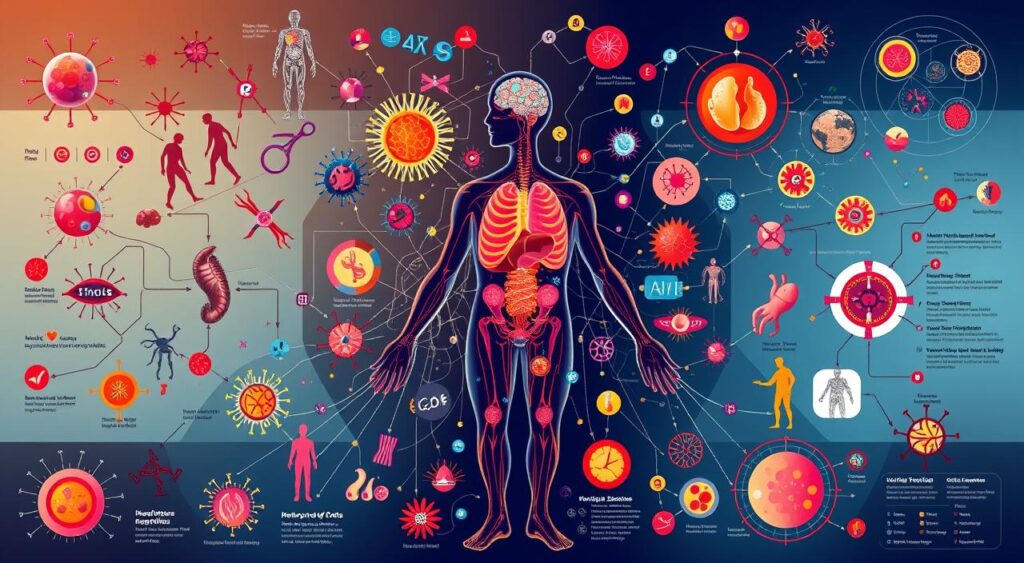Gain insights into autoimmune diseases, including symptoms, causes, and treatment options to better understand and manage these complex conditions.
Autoimmune diseases: These diseases happen when the immune system attacks healthy cells by mistake. This can lead to long-term health problems that really affect our daily lives.
It’s very important to learn more about autoimmune diseases. Many people don’t get diagnosed or are misdiagnosed for years. Groups like the National Institute of Health and Mayo Clinic are working hard to provide more information and support. In this article, we’ll look into the details of these immune system disorders. We’ll cover their types, symptoms, causes, and how to manage them.

Key Takeaways
- Autoimmune diseases affect around 50 million Americans.
- These disorders involve the immune system mistakenly attacking healthy cells.
- Increased awareness is essential for timely diagnosis and treatment.
- Common autoimmune disorders include rheumatoid arthritis, lupus, and multiple sclerosis.
- Recognizing symptoms early can lead to better management of these conditions.
- Research is vital for advancements in treatment options and understanding of autoimmune diseases.
Introduction to Autoimmune Diseases
Autoimmune diseases happen when the immune system gets confused. It sees healthy cells as enemies. This can cause serious problems in different parts of the body. There are over 80 types of autoimmune diseases, showing how complex they are.
More and more people are being diagnosed with autoimmune diseases. Millions worldwide are affected. Studies show that women are more likely to get these diseases, making it important to focus on helping them.
Autoimmune diseases can start at any age, but they often show up in young adults. Conditions like rheumatoid arthritis, lupus, and multiple sclerosis are common. Each one brings its own set of challenges.
| Autoimmune Disease | Common Symptoms | Demographics Affected |
|---|---|---|
| Rheumatoid Arthritis | Joint pain, stiffness | Primarily women, ages 30-60 |
| Lupus | Fatigue, skin rashes | Mostly women, ages 15-44 |
| Multiple Sclerosis | Nerve disturbances, fatigue | Women more than men, ages 20-50 |
It’s important to understand autoimmune diseases to find better ways to manage them. Raising awareness can help get people diagnosed faster. It also helps support those living with these diseases.
Understanding the Immune System and Its Disorders
The immune system is key in fighting off infections and diseases. It has parts like white blood cells, antibodies, and organs like the spleen and lymph nodes. This network finds and gets rid of harmful invaders while keeping the body’s cells safe.
When the body meets foreign invaders, the immune system springs into action. It uses cell-mediated immunity and humoral immunity to fight off the threat. But, if it doesn’t work right, it can attack healthy tissues, causing autoimmune diseases.
Many things can make the immune system go wrong. Genetics can make some people more likely to get certain diseases. Environmental factors like infections and toxins can also trigger immune responses. Hormonal changes, especially in women, can play a role in autoimmune disorders.
The immune system’s complexity can sometimes cause it to overreact or underreact. Autoantibodies, which attack the body’s own tissues, are a big part of autoimmune diseases. Learning about the immune system helps us understand how these disorders start. This shows why research in this area is so important.
| Factor | Impact on Immune System |
|---|---|
| Genetic predisposition | Increases susceptibility to autoimmune diseases |
| Environmental influences | Can trigger immune responses that lead to disorders |
| Hormonal changes | More common in women, affecting immune response |
Common Types of Autoimmune Disorders
Autoimmune disorders affect many people and can impact health greatly. Each condition has its own set of challenges and symptoms. Here, we look at three major ones: rheumatoid arthritis, lupus, and multiple sclerosis.
Rheumatoid Arthritis
Rheumatoid arthritis is a chronic condition that mainly affects the joints. It causes pain, swelling, stiffness, and deep fatigue. The immune system attacks the lining of the joints, leading to inflammation and damage.
Early diagnosis is key to managing symptoms and preventing further damage to the joints.
Lupus
Lupus, or systemic lupus erythematosus (SLE), is a widespread autoimmune disorder. It can affect many parts of the body, causing skin rashes, joint pain, and fatigue. Diagnosing and treating lupus can be complex, requiring a detailed approach.
Multiple Sclerosis
Multiple sclerosis affects the central nervous system. It disrupts communication between the brain and the body, causing symptoms like tingling, muscle weakness, and vision problems. Early treatment is crucial to prevent long-term disability.
| Autoimmune Disorder | Primary Symptoms | Impact on Body |
|---|---|---|
| Rheumatoid Arthritis | Joint pain, swelling, fatigue | Affects joints and surrounding tissues |
| Lupus | Skin rashes, joint pain, fatigue | Affects multiple organ systems |
| Multiple Sclerosis | Tingling, muscle weakness, vision problems | Affects central nervous system |
Autoimmune Disease Symptoms: Recognizing the Warning Signs
Knowing the signs of autoimmune diseases is key to catching them early. People might notice a range of symptoms that hint at these conditions. Spotting these signs early can lead to better health outcomes.
Fatigue and Malaise
Fatigue is a common symptom, feeling like deep tiredness that doesn’t get better with rest. It can make everyday tasks hard and lower your quality of life. If you’re always tired, see a doctor to check for possible autoimmune diseases.
Joint Pain and Inflammation
Joint pain and swelling are common in autoimmune diseases. They can make moving hard and cause pain. Spotting these signs early can help find treatments to ease pain and improve movement.
Skin Changes
Skin issues like rashes or color changes can signal autoimmune diseases, like lupus. These changes can look different and vary in how severe they are. Watching your skin can help doctors find and treat related autoimmune diseases.

| Symptom | Description |
|---|---|
| Fatigue | Persistent tiredness not improved by rest, impacting daily activities. |
| Joint Pain | Swelling and inflammation in joints leading to difficulty in movement. |
| Skin Changes | Rashes or discoloration, often indicating underlying autoimmune conditions. |
Causes of Autoimmune Diseases: What Science Says
Autoimmune diseases come from a mix of genetic factors and outside influences. Some people have genes that make them more likely to get these diseases. But, not everyone with these genes will get sick. This shows how important environmental triggers are in starting these diseases.
Studies show that many things can start autoimmune diseases. These include:
- Infections from bacteria or viruses
- Toxins like heavy metals
- Food sensitivities
- Stress that changes how our immune system works
Also, research on gut bacteria is revealing new things. A healthy mix of gut bacteria helps keep our immune system in check. But, an imbalance can lead to autoimmune diseases.
Learning about autoimmune disease causes helps us find ways to prevent and treat them. More research will help us understand these diseases better. This could lead to new treatments and better care for patients.
| Factor | Role in Autoimmunity |
|---|---|
| Genetic Factors | Predispose individuals to autoimmune diseases |
| Environmental Triggers | Activate autoimmune responses in genetically susceptible individuals |
| Infections | Can stimulate immune system and lead to misdirected attacks on the body |
| Microbiome | Helps modulate immune responses; imbalance may trigger autoimmunity |
Diagnosis of Autoimmune Diseases: A Comprehensive Approach
Diagnosing autoimmune diseases needs a detailed plan. This includes looking at the patient’s history, running lab tests, and using imaging techniques. This way, doctors can be sure and start treatment quickly.
Lab Tests and Imaging
Lab tests are key in finding autoimmune diseases. Doctors often use blood tests, like the antinuclear antibody (ANA) test, to find abnormal antibodies. These tests help spot autoimmune conditions early.
Other lab tests check how well organs work and if there’s inflammation. This gives doctors a full picture of the patient’s health.
Imaging techniques also help see inflammation and damage in the body. X-rays, MRI scans, and ultrasounds show problems in joints and soft tissues. This is important for making a diagnosis.
Patient History and Physical Examination
Getting a patient’s history is crucial. Doctors ask about symptoms, family health, and what might cause the disease. This info, along with a physical check-up, helps doctors understand the patient’s situation.
This detailed approach leads to early and correct diagnosis. It means patients can get the right treatment sooner, improving their health.

Autoimmune Disease Treatment Options: Finding Relief
Managing autoimmune diseases needs a careful approach to autoimmune disease treatment. There are many therapy options to help ease symptoms and slow the disease. Every patient is different, so a personalized plan is key. Working with healthcare providers to create a tailored treatment plan can greatly improve outcomes.
Commonly used medications include:
- Corticosteroids: These drugs reduce inflammation and calm the immune system.
- Immunosuppressive therapies: They stop the immune response to protect healthy tissues.
- Biologics: These new medications target specific immune system pathways, offering fresh treatment options.
Doctors stress the importance of watching for side effects and adjusting therapy options as needed. A strong partnership between patients and healthcare providers is crucial for managing autoimmune diseases effectively.
Autoimmune Disease Management: Living with Chronic Conditions
Managing autoimmune diseases needs a mix of strategies. Making lifestyle changes can greatly improve health and life quality. Patients can find help in diet changes, exercise, and stress management. These steps help create a lasting path to better health.
Lifestyle Changes and Wellness Strategies
Changing your lifestyle is key in managing autoimmune diseases. Some good strategies include:
- Balanced Diet: Eating foods that fight inflammation can lessen flare-ups.
- Regular Exercise: Doing moderate exercise can increase energy and reduce joint pain.
- Stress Reduction: Mindfulness, yoga, or meditation can help symptoms and mood.
Adding these to your life not only helps your body but also your mind. It’s crucial for those with chronic conditions.
Support Groups and Resources
Getting support is important for managing autoimmune diseases. Connecting with others who understand can create a sense of community. Here are some great resources:
- National Institute of Health: Provides detailed info on autoimmune diseases.
- Chronic Illness Alliance: Offers emotional support and advocacy for those with chronic conditions.
- Autoimmune Association: A place for educational materials and networking.
Being part of these groups can make managing autoimmune diseases easier. It helps people live better lives.
| Strategy | Description | Benefits |
|---|---|---|
| Balanced Diet | Focus on anti-inflammatory foods | Reduces flare-ups |
| Regular Exercise | Engage in moderate activities | Boosts energy, reduces discomfort |
| Stress Reduction | Meditation, yoga, mindfulness | Improves emotional well-being |
Research and Advances in Autoimmune Disease Treatments
Recent research in autoimmune diseases is exciting. It’s moving beyond old ways to new, promising therapies. These include stem cell transplants and new biologics that could stop or slow disease.
Clinical trials are key in this progress. They help test new treatments and see if they work well. This research helps us understand diseases better and find new ways to treat them.
- Stem Cell Transplants: A strategy that holds promise for reversing autoimmunity by regenerating healthy immune systems.
- New Biologics: Targeted therapies designed to interrupt specific pathways involved in autoimmune responses.
- Personalized Medicine: Tailoring treatments based on genetic profiles to improve efficacy.
New research is showing that we can speed up finding good treatments. Scientists are hopeful that their work will lead to big improvements. They believe we’re on the verge of new ways to fight autoimmune diseases.
Future Perspectives on Autoimmune Diseases
The way we manage autoimmune diseases is changing a lot. The future looks bright with emerging therapies and new ways to treat them. Predictive medicine is key, helping doctors tailor treatments to each patient.
Research on genetics and biomarkers is leading to big breakthroughs. This means doctors can diagnose and treat patients sooner and more effectively. It’s a step towards better care for those with autoimmune diseases.
Technology is also playing a big role in autoimmune care. Telemedicine and mobile health apps are making it easier to stay in touch with doctors. This helps patients get the help they need quickly and easily.
| Focus Area | Description | Impact on Patients |
|---|---|---|
| Genetic Research | Identifying genetic markers associated with autoimmune disorders | Enables early diagnosis and tailored treatment plans |
| Predictive Medicine | Utilizing data to predict disease progression and treatment response | Aims for proactive management and improved outcomes |
| Telemedicine | Remote consultations and monitoring for patients | Enhances accessibility and ongoing patient support |
| Emerging Therapies | Development of novel treatments targeting specific pathways | Offers new hope for effective disease management |
As we move forward, working together will lead to even more progress. Researchers, doctors, and tech experts will make a big difference. Their teamwork will help us understand and manage autoimmune diseases better, improving life for those affected.
Conclusion
Understanding autoimmune diseases is key to grasping these often-misunderstood conditions. Early recognition of symptoms is vital for effective management. This shows how crucial awareness is for both patients and healthcare providers.
Talking openly with healthcare professionals can greatly improve outcomes for those with autoimmune disorders. Managing these conditions involves medical treatment, lifestyle changes, emotional support, and access to reliable resources. The journey with an autoimmune disease is tough, but with awareness and the right strategies, quality of life can improve.
Research in this area is growing, offering new treatments and management strategies. These advancements aim to empower patients more. Increased awareness, support networks, and ongoing research are vital to better the lives of those with chronic conditions.
FAQ
Q: What are autoimmune diseases?
A: Autoimmune diseases happen when the immune system attacks healthy cells. This leads to health problems. Over 80 different autoimmune disorders affect many people worldwide.
Q: What are the common autoimmune disease symptoms?
A: Symptoms include fatigue, joint pain, and skin changes like rashes. These signs can differ based on the disease.
Q: How are autoimmune diseases diagnosed?
A: Doctors use lab tests, imaging, and a patient’s history to diagnose. Tests like the ANA test help find autoimmune activity.
Q: What are the causes of autoimmune diseases?
A: Causes include genetics, infections, and toxins. The microbiome may also play a role. Knowing these causes helps in prevention and treatment.
Q: What treatment options are available for autoimmune diseases?
A: Treatments include immunosuppressives, corticosteroids, and biologics. A tailored approach is key to managing the disease effectively.
Q: How can lifestyle changes support autoimmune disease management?
A: Changes like a balanced diet and exercise help. Stress management also plays a role. These steps improve overall health.
Q: Are there support resources available for those with autoimmune conditions?
A: Yes, there are many support groups and resources. They offer emotional support, education, and a sense of community.
Q: What advances are being made in autoimmune disease research?
A: Research aims to find new treatments, including clinical trials. This progress is vital for better treatments.
Q: What does the future hold for autoimmune disease treatments?
A: The future looks bright with advances in predictive medicine and new therapies. Research into genetic markers and personalized treatments is promising.
